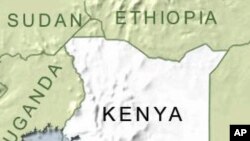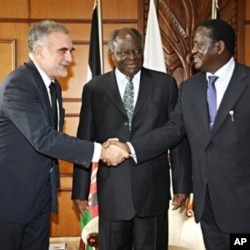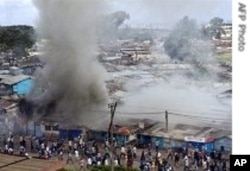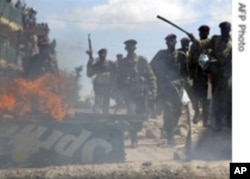A list of 20 names of figures believed most responsible for Kenya’s 2008 post-election violence has been handed over to judges in the pre-trial chamber of the International Criminal Court by ICC Chief Prosecutor Luis Moreno Ocampo. The suspects, who have not yet been named publicly, were culled from a longer list that was reviewed after judges asked for more information. The list is expected to be the main catalyst for starting Kenya’s truth and reconciliation process to assign responsibility for the violence that led to 1,300 deaths and the displacement of 300,000 Kenyans two years ago.
Kenyan-born law professor and dean of the law school at the University of Buffalo, Makau Mutua, says that the international focus on some of Kenya’s most prominent political and business leaders will help Kenyans put off having to mete out justice locally amid an atmosphere of corruption and political favoritism.
“A local tribunal essentially would put these people on the docket in Nairobi. It is not possible to do this without collapsing the coalition government. Number two, I would suspect that there are suspects who command enormous sums of money, have enormous ethnic loyalties, are likely to reignite the violence if they were indicted and tried in Nairobi. And finally and perhaps most importantly, is the fact that any judicial process in Nairobi is bound to be compromised by political machinations. So I do not expect to see an effective pursuit of justice for the victims of the violence from Nairobi,” he observed.
Because he believes that a standard of corruption has permeated Kenya’s political and judiciary systems, Professor Mutua says he believes that the most effective way for Kenyans to pursue their own local forms of justice for the perpetrators of the 2008 violence is through the adopting of a new constitution that will give citizens greater individual protections.
The New York State university law professor says that the purpose of applying justice internationally on a select few also can restore a sense of propriety and human dignity for individuals who suffered great losses in Kenya.
“I see the International Criminal Court as the only viable venue for the trials of some of these individuals. Now this means that we must understand that only those who have the greatest responsibility will be tried, because the International Criminal Court cannot try all the Kenyans who were involved in these violations. So I think the main authors and the main executors of the violence will face responsibility at the International Criminal Court. We must understand that international law does not replace domestic law. International law acts as a gentle civilizer of nations and provides a roadmap for those nations to act or to comport their conduct with international norms,” he pointed out.
One of the concerns voiced by chief prosecutor Moreno Ocampo as he presented the names to the court last Wednesday is that officials of Kenya’s two main political parties – the ruling PNU (Party of National Unity) and the opposition ODM (Orange Democratic Movement) utilized personal, government, and ethnic resources two years ago to organize and finance attacks on civilians. Professor Mutua says the way that influence was translated into real power varied according to the politician’s standing and political party.
“The violence that could be traced to the state is more a function of, in my view, the PNU side, which controlled the state at the time. So that we’ve seen, for example, the evidence of killings by police and other armed forces of unarmed civilians in areas which are controlled by ODM. So I would say that that’s more of a problem for the PNU side than for the ODM side. On the ODM side, I think there is evidence that much of the violence was committed by militias and other youths who are organized and armed and orchestrated by some senior officials in ODM, especially from the Rift Valley,” he noted.
A favorable response by court justices to the special prosecutor’s findings would enable the court to authorize a formal investigation of the violence, which could ultimately bring the case to trial at the International Criminal Court.







